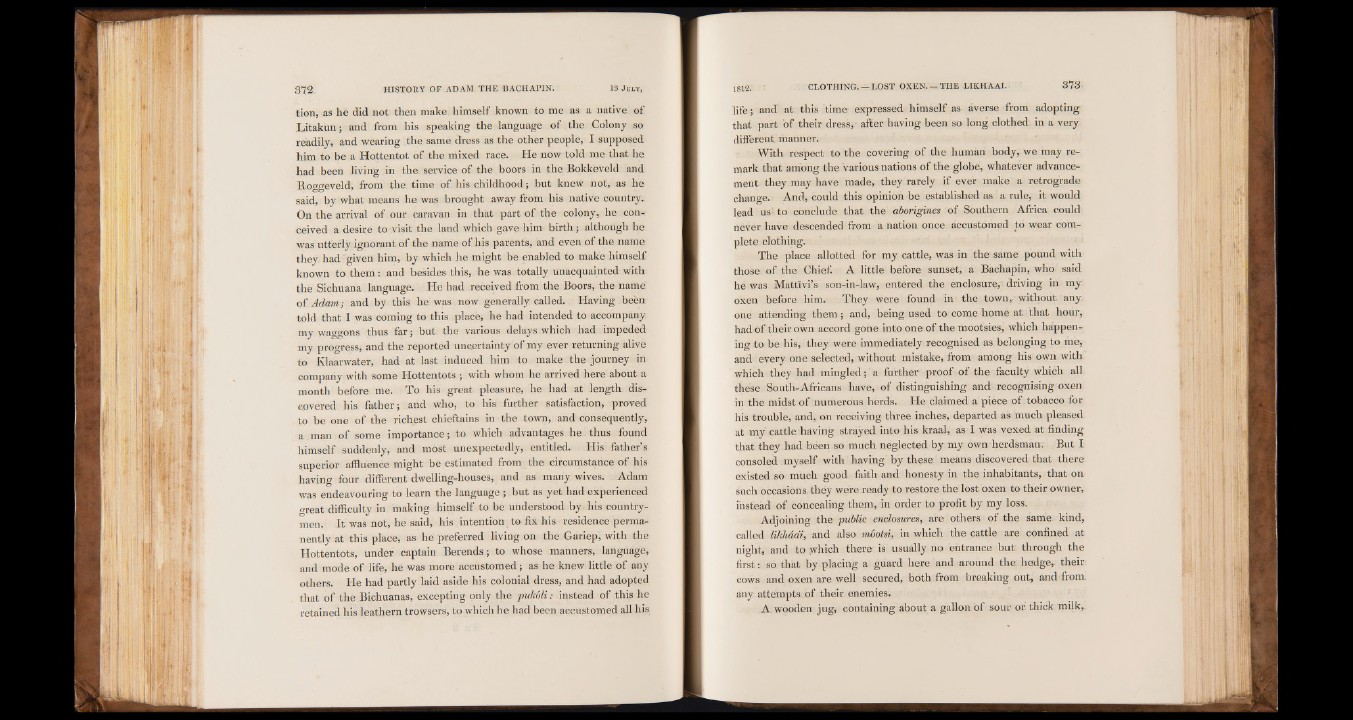
tion, as he did not then make: himself known to me as a native of
Litakun; and from his speaking the language of the Colony so
readily, and wearing the same dress as the other people, I supposed
him to be a Hottentot of the mixed race. He now told me that he
had been living in the. service of the boors in the Bokkeveld and
Roggeveld, from the time of his childhood; but knew not, as he
said, by what means he was brought away from his native country..
On the arrival of our caravan in that part of the colony, he conceived
a desire to visit the land which gave him birth; although he
was utterly ignorant of the name of his parents, and even of the name
they, had given him, by which he might be enabled to make himself
known to them: and besides this, he was totally unacquainted with
the Sichuana language. He had received from the Boors, the name
of Adam; and by this he was now generally called. Having been
told that I was coming to this place, he had intended to accompany,
my waggons thus far; but the various delays .which had impeded-
my progress, and the reported uncertainty of my ever returning alive
to Klaarwater, had at last induced him to make the journey in
company with some Hottentots ; with whom he arrived here about a
month before me. To his great pleasure, he had at length discovered
his father; and who, to his further satisfaction, proved
to be one of the richest chieftains in the town, and consequently,
a man:of some importance; to which advantages he thus found
himself suddenly, and most unexpectedly, entitled. His. father’s
superior affluence might be estimated from the circumstance of his
having four different dwelling-houses, and as many wives. Adam
was endeavouring to learn the language ; but as yet had experienced
o-reat difficulty in making himself to be understood by-his countrymen.
It was not, he said, his intention to fix his residence permanently
at this place, as he preferred living on the Gariep, with the
Hottentots, under captain Berends; to whose manners, language,
and mode of life, he was more accustomed; as he knew little of any
others. He had partly laid aside his colonial dress, and had adopted
that of the Bichuanas, excepting only the pukbli| instead of this he
retained his leathern trowsers, to which he had been accustomed all his
life ; and at this time expressed himself as averse from adopting
that part of their dress,- after having been so long clothed in a very
different manner.
With respect to the covering of the human body, we may remark
that among the various nations of the globe, whatever advancement
they may have made, they rarely if ever make a retrograde
change. And, could this opinion be established as a rule, it would
lead us- to conclude that the aborigines of Southern Africa could
never have descended from a nation once accustomed to wear complete
clothing.
The place allotted for my cattle, was in the same pound with
those of the Chief. A little before sunset, a Bachapin, who said
he was Mattivi’s son-in-law, entered the enclosure," driving in my
oxen before him. They were found in the town,-without any.
one attending them; and, being used to come home at that hour,
had of their own accord gone into one of the mootsies, which happening
to be his, they were immediately recognised as belonging to me,
and every one selected, without mistake, from among his own with
which they had mingled ; a further proof of the faculty which all
these South-Africans have, of distinguishing and recognising oxen
in the midst of numerous herds. He claimed a piece o f tobacco for
his trouble, and, on receiving three inches, departed as much pleased
at my cattle having strayed into his kraal, as I was vexed at finding
that they had been so much neglected by my own herdsman. But I
consoled myself with having by these means discovered that there
existed so much good faith and honesty in the inhabitants, that, on
such occasions, they were ready to restore the lost oxen to their owner,
instead of concealing them, in order to profit by my loss.
Adjoining the public enclosures, are others of the same kind,
called likhaai, and also mootsi, in which the cattle are confined at
night, and to which there is usually no entrance but: through the
first:, so that by placing a guard here and around the: hedge, their
cows and oxen are well secured, both from breaking out, and from,
any attempts of their enemies.
A wooden jug, containing about a gallon of sour or thick milk,